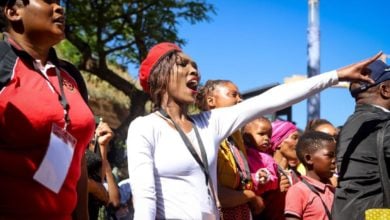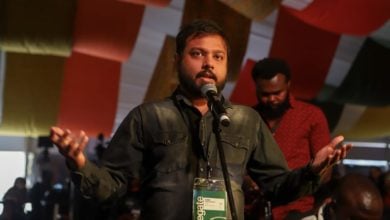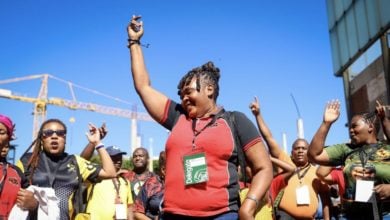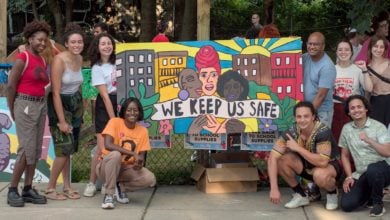My name is Bryan Castro
and it is my honor to stand along your side today. I have been a
member of the Party for Socialism and Liberation for almost two years
and in that time I have taken part in a wide variety of struggles,
from standing up against cutbacks to our communities, to demanding an
end to the ongoing imperialist wars and occupations.
I would like to share a
few things about myself and why I joined the Party for Socialism and
Liberation.
I was born in 1986 in
Tegucigalpa, Honduras. A year later, my mother and my aunt Marta
embarked on a long journey toward the United States in hopes of
finding a better future; just like many of our brothers and sisters
in Latin America. I was left in the care of my beautiful grandmother.
Growing up in the late
1980s to early 1990s in Honduras definitely helped make me who I am
today. I would wake up early every morning to the serenades of the
multiple roosters in Barrio Bellavista and to the delightful scent of
fresh brewed coffee that grandmother would make; sometimes we were
short on eggs and chorizo, but we always had coffee.
With no restrictions or
curfew, and a rebellious attitude, I roamed the streets like so many
other kids in Honduras from dawn to sunset to midnight and even
sometimes to dawn again. A lot of my time was spent in the market of
San Isidro where I and other catrachos
—which
means someone from Honduras—would run wild like dogs nabbing
whatever we could pocket especially toys and tamales. Trouble was
never distant, especially in El Parque Central or “Central Park,”
which was one of the many well-known areas where drugs and
prostitution were in abundance in open display at all times. It was
here where many came to engage in pegamento,
or sniffing glue, from which many graduated to stronger and more
addictive drugs; many close friends were lost from the moment they
inhaled their first bag.
In the late 1980s early
1990s, there was a great influx of gangs in the neighborhoods of
Central America, mainly in Honduras and El Salvador, with many
migrating to escape the ravages of U.S.-backed repressive
governments, the civil conflicts in Central America and the brutal
exploitation of foreign companies like United Fruit, now known as
Chiquita.
Many children were left to
fend for themselves, so local gangs were formed and new families were
born. “Los Cholos” was the local gang in Barrio Bellavista and
also was like a family to me, they showed me the ropes, and the
rules, of how to survive.
In 1993, at the age of 8,
I entered the United States and quickly realized that the streets
were not made out of gold like many would fantasize back in Honduras.
Rather, they were made out of cement, gravel, sand and water, and you
had to watch where you stepped or you would fall through the cracks.
Five chaotic years later, after a bad divorce, my mother ended up
homeless for a whole week in the richest country in the hemisphere,
together with me and my 1-year-old sister. That turned out to be a
pivotal point in my life.
We finally ended up in the
New York City shelter system for the next three years in Longwood
Avenue in the Bronx, where I later discovered Malcolm X’s
autobiography. Its militant “by any means necessary” outlook
inspired me, as did Ché Guevara’s idea of a united Latin America,
and his comrades’ selfless revolutionary actions for a socialist
world.
I gained a deeper understanding and began to solidify my
ideological outlook, and continued to drown myself in books like Karl
Marx’s Communist Manifesto. It became real clear the reasons why
and how there were so many disparities and injustices in society
while growing up in Honduras and why it was not very different here
in the United States of America. I was then able to find my identity
as part of the working class and against the capitalist class.
My childhood is not
unique. There are many children in every corner of this planet who
cannot speak for themselves, who will never get the chance to, and
live in far worse and devastating conditions like in Palestine and
Africa, because of all the imperialist plunder and exploitation.
But we can and we must
bring an end this oppression; these social and economic inequalities
can be eradicated. I chose to stand up and fight back, on behalf of
my sister’s future, and people like my mother who was forced to
seek a better future here in the United States. I fight for every
undocumented and documented worker in the U.S. because we all sell
our labor [power] for miserable wages compared to what the
capitalists make in profit off our labor.
I joined the Party for
Socialism and Liberation because the things I fight for, the PSL
fights for too. Every member of the PSL, including myself, at some
point in our life has made a commitment to fight until the defeat of
capitalism and the spring of a socialist society.
Membership in the PSL is
not a website type of thing; every member goes through a candidacy
period of six months where you take a series of political classes
taught by other members of the party. Over time, you become equipped
with essential tools, knowledge and history that help guide you to
the journey of becoming a revolutionary. We are a party of activists,
and deeply involved in the day-to-day struggles of the working class.
The Party for Socialism and Liberation is a
multinational working-class party in the belly of the beast, fighting
for the rights of every person in this room and every worker against
racism, sexism and exploitation. Join us—Hasta La Victoria Siempre!






